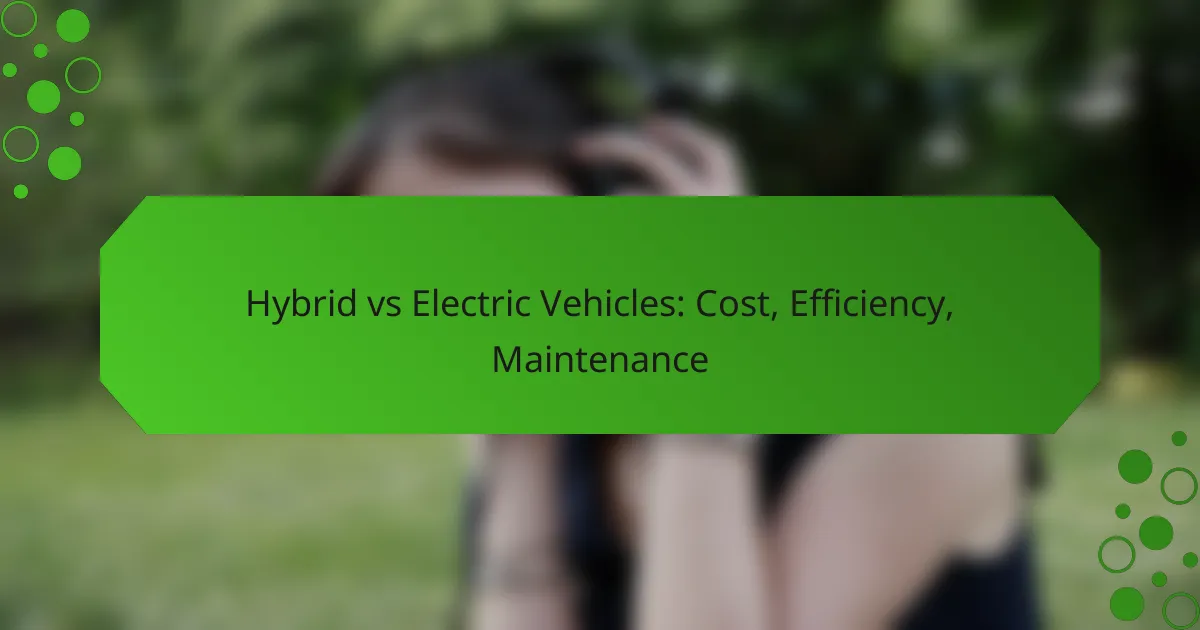As the automotive industry evolves, understanding the differences between hybrid and electric vehicles (EVs) becomes essential for consumers. These vehicles vary in cost, efficiency, and maintenance, influencing ownership experiences and long-term expenses. By examining these factors, potential buyers can make informed choices that align with their financial and driving needs.

What Are the Cost Differences Between Hybrid and Electric Vehicles?
The cost differences between hybrid and electric vehicles (EVs) primarily stem from their initial purchase prices, long-term ownership expenses, and various incentives. Understanding these factors can help consumers make informed decisions based on their budget and driving habits.
Initial purchase price comparison
Generally, electric vehicles tend to have a higher initial purchase price compared to hybrids. For instance, while hybrids may start in the low tens of thousands of USD, many EVs begin in the mid to high tens of thousands. However, prices can vary significantly based on the model and features.
It’s essential to consider the specific models you are interested in, as some hybrids can be more affordable than entry-level electric vehicles. Researching available options can help you find a vehicle that fits your budget.
Long-term ownership costs
Long-term ownership costs for electric vehicles are typically lower than for hybrids. EVs benefit from reduced fuel costs, as electricity is often cheaper than gasoline. Additionally, maintenance costs for electric vehicles are generally lower due to fewer moving parts and no need for oil changes.
On the other hand, hybrids may incur higher maintenance costs over time due to their dual powertrains. Owners should factor in these long-term expenses when evaluating the overall cost of ownership.
Government incentives for electric vehicles
Many governments offer incentives for purchasing electric vehicles, which can significantly reduce the effective purchase price. In the United States, federal tax credits can range from a few thousand to over seven thousand USD, depending on the vehicle’s specifications.
In addition to federal incentives, many states and local governments provide additional rebates or tax credits, making EVs more financially attractive. Researching available incentives in your area can help you maximize savings.
Insurance cost variations
Insurance costs can vary between hybrid and electric vehicles, often depending on the vehicle’s value and repair costs. Generally, electric vehicles may have higher insurance premiums due to their higher initial cost and specialized parts.
However, some insurance companies offer discounts for electric vehicles, recognizing their lower risk of accidents and environmental benefits. It’s advisable to shop around and compare insurance quotes to find the best rates for your chosen vehicle.
Resale value analysis
The resale value of electric vehicles is increasingly competitive with hybrids, though it can vary based on market demand and technological advancements. Historically, hybrids have maintained strong resale values due to their established presence in the market.
As electric vehicles become more mainstream, their resale values are expected to improve. Factors such as battery life, brand reputation, and overall vehicle condition will play critical roles in determining resale value. Keeping these aspects in mind can help you make a more informed purchase decision.

How Do Hybrid and Electric Vehicles Compare in Efficiency?
Hybrid and electric vehicles (EVs) differ significantly in efficiency, with each type offering distinct advantages. Hybrids typically use a combination of gasoline and electric power, while EVs rely solely on electric energy, leading to different fuel and energy consumption metrics.
Fuel efficiency metrics for hybrids
Hybrid vehicles are designed to optimize fuel efficiency by combining an internal combustion engine with an electric motor. They often achieve fuel economy ratings ranging from the mid-40s to low 60s miles per gallon (MPG), depending on the model and driving conditions. This efficiency is enhanced through regenerative braking and automatic engine shut-off during idle periods.
For example, popular hybrid models like the Toyota Prius can deliver around 56 MPG combined, making them a cost-effective choice for urban and highway driving. However, real-world performance may vary based on driving habits and terrain.
Energy consumption of electric vehicles
Electric vehicles measure energy consumption in kilowatt-hours per 100 miles (kWh/100 mi). Most EVs consume between 15 to 25 kWh/100 mi, translating to lower energy costs compared to gasoline. This efficiency is largely due to the absence of a combustion engine, allowing for more direct energy use.
For instance, the Tesla Model 3 averages about 15 kWh/100 mi, making it one of the most efficient EVs on the market. Charging costs can vary, but many owners find that charging at home is significantly cheaper than filling up a gas tank.
Real-world driving range comparisons
The driving range of hybrids typically spans 400 to 600 miles on a full tank, thanks to their gasoline engines. This range can be advantageous for longer trips where charging infrastructure may be limited. Hybrids can seamlessly switch between electric and gasoline power, ensuring drivers are less concerned about running out of battery.
In contrast, electric vehicles generally offer a range of 150 to 370 miles on a full charge, depending on the model. While advancements in battery technology are improving these figures, potential buyers should consider their typical driving habits and access to charging stations. For example, the Chevrolet Bolt EV provides around 259 miles of range, suitable for most daily commutes.
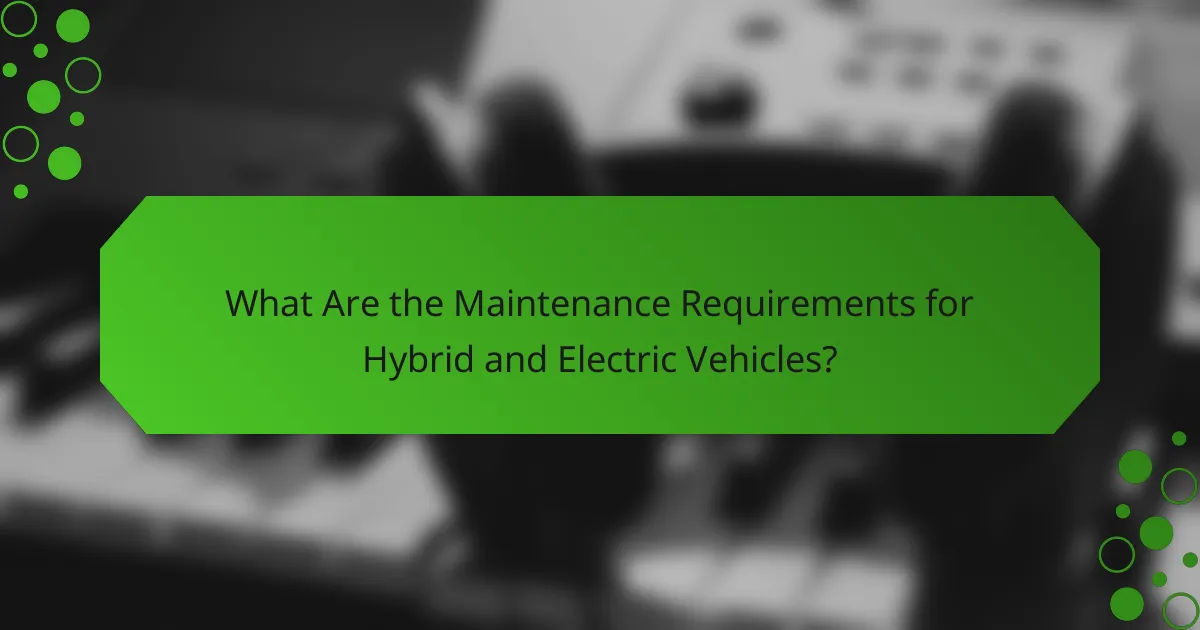
What Are the Maintenance Requirements for Hybrid and Electric Vehicles?
Hybrid and electric vehicles have distinct maintenance requirements compared to traditional gasoline vehicles. While both types generally require less frequent servicing, understanding their specific needs can help owners manage costs and ensure longevity.
Routine maintenance needs for hybrids
Hybrid vehicles combine an internal combustion engine with an electric motor, necessitating unique maintenance. Regular checks on the engine, battery, and hybrid system are crucial. Owners should expect to perform oil changes every 5,000 to 10,000 miles and inspect the battery and electrical systems periodically.
Additionally, brake systems in hybrids often require less frequent servicing due to regenerative braking, which can extend the lifespan of brake pads. However, it’s still essential to monitor brake performance regularly.
Maintenance specifics for electric vehicles
Electric vehicles (EVs) have fewer moving parts, resulting in lower maintenance needs. Key areas of focus include battery health, tire wear, and brake fluid levels. Most EV manufacturers recommend battery checks every few years, as battery performance can degrade over time.
Unlike hybrids, EVs do not require oil changes, but tire rotation and brake inspections should be conducted regularly to ensure optimal performance. Many EVs also come with maintenance plans that cover these essentials for a certain period or mileage.
Cost of repairs and parts
The cost of repairs and parts for hybrids and EVs can vary significantly. Generally, hybrid vehicle repairs may be more expensive due to the complexity of their systems, with battery replacements potentially costing several thousand dollars. However, many manufacturers offer warranties that cover battery issues for extended periods.
In contrast, electric vehicle repairs tend to be less frequent and less costly overall, primarily due to fewer mechanical components. Owners can expect lower long-term maintenance costs, but initial repairs, especially for battery replacements, can still be substantial. It’s advisable to budget for these potential expenses when considering ownership.
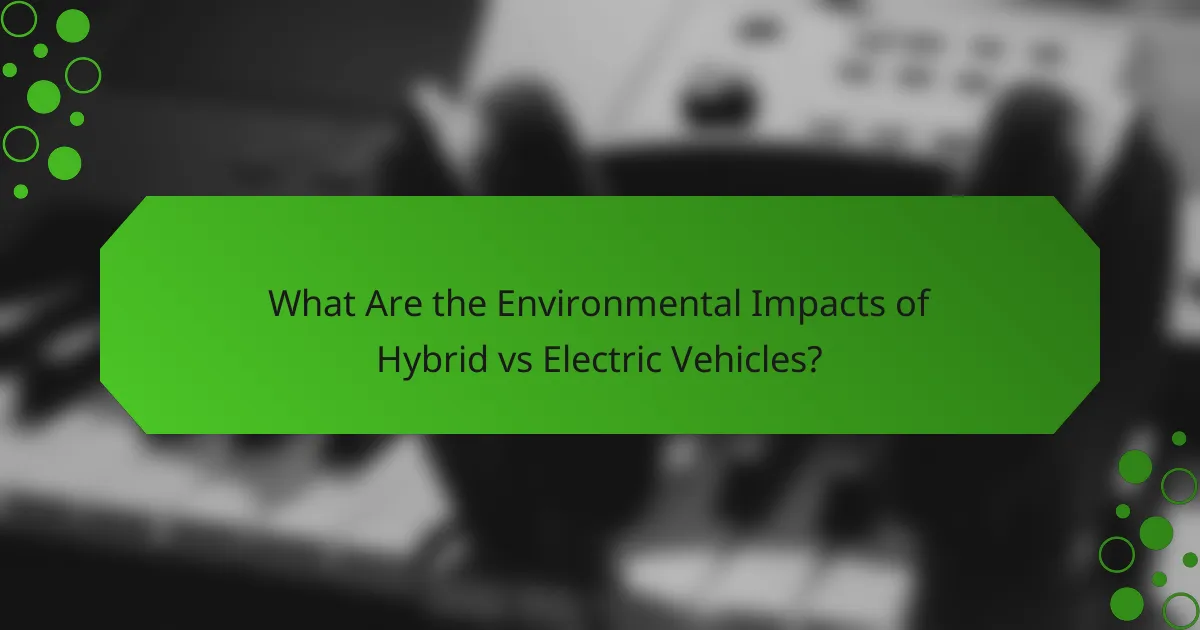
What Are the Environmental Impacts of Hybrid vs Electric Vehicles?
Hybrid and electric vehicles (EVs) significantly differ in their environmental impacts, primarily due to their emissions and battery management. While EVs produce zero tailpipe emissions, hybrids still rely on gasoline, resulting in lower but present emissions. Understanding these differences is crucial for making informed choices about vehicle purchases.
Emissions comparison
Electric vehicles generate no direct emissions during operation, making them a cleaner option for urban environments. In contrast, hybrids emit lower levels of greenhouse gases compared to traditional gasoline vehicles, but they still contribute to air pollution due to their reliance on fossil fuels.
The overall emissions of both vehicle types depend on the energy sources used for electricity generation. For instance, if the electricity comes from renewable sources, EVs can be much more environmentally friendly than hybrids. However, in regions where coal is the primary energy source, the emissions advantage of EVs may diminish.
Battery disposal and recycling issues
Both hybrid and electric vehicles use lithium-ion batteries, which pose challenges for disposal and recycling. Improper disposal can lead to environmental contamination, while recycling processes are still developing. It’s essential to consider the lifecycle of these batteries when evaluating the overall environmental impact of these vehicles.
Efforts are underway to improve battery recycling technologies, which can recover valuable materials and reduce the need for new raw materials. Consumers should look for manufacturers that offer take-back programs or partnerships with recycling facilities to ensure responsible battery disposal.
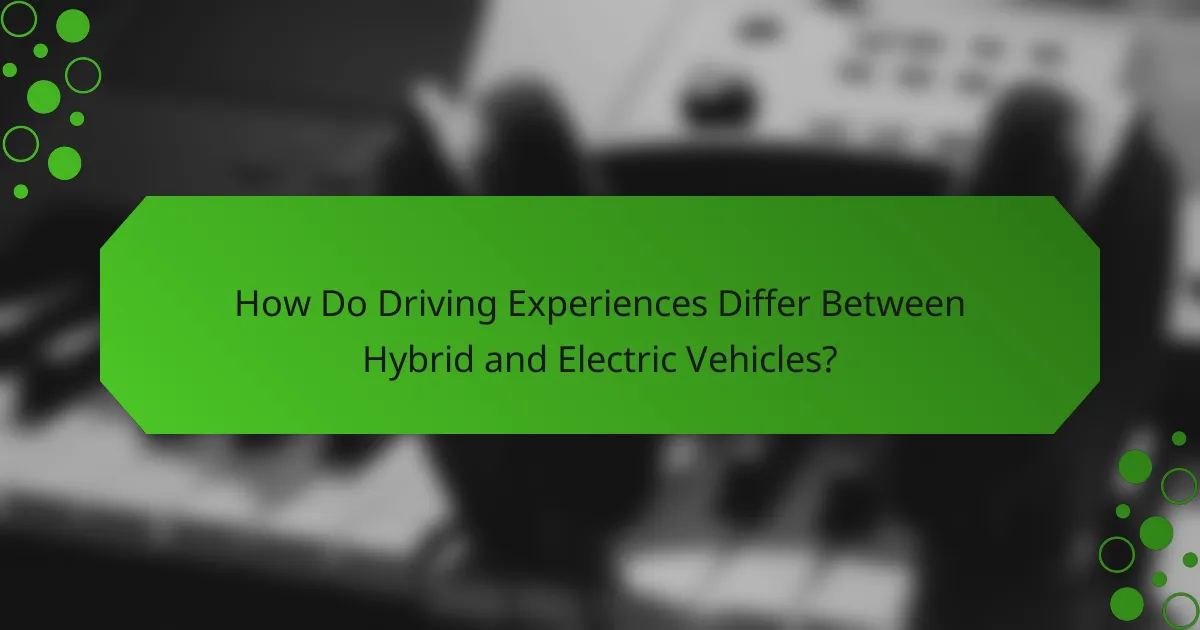
How Do Driving Experiences Differ Between Hybrid and Electric Vehicles?
Driving experiences between hybrid and electric vehicles vary significantly in terms of performance, range, and refueling. Hybrids combine a gasoline engine with an electric motor, while electric vehicles (EVs) rely solely on electric power, affecting their acceleration, driving range, and charging times.
Acceleration and performance analysis
Electric vehicles typically offer quicker acceleration than hybrids due to their instant torque delivery. Many EVs can reach 0 to 60 mph in under 5 seconds, while hybrids generally take longer, often in the range of 6 to 8 seconds, depending on the model.
However, hybrids may provide a more familiar driving experience for those used to traditional gasoline vehicles, as they can switch seamlessly between electric and gasoline power. This can be advantageous in varied driving conditions, where hybrids can optimize performance based on the situation.
Driving range and refueling time
Hybrid vehicles usually have a longer driving range than electric vehicles since they can rely on gasoline when the electric battery is depleted. Many hybrids can achieve ranges of 400 to 600 miles on a single tank, while most electric vehicles offer ranges between 150 to 300 miles, depending on the battery capacity.
Refueling time also differs significantly. Filling a hybrid’s gas tank takes just a few minutes, while charging an electric vehicle can take anywhere from 30 minutes at a fast charger to several hours at home, depending on the charging station and battery size. For those who drive long distances regularly, the convenience of a hybrid may outweigh the benefits of an electric vehicle.
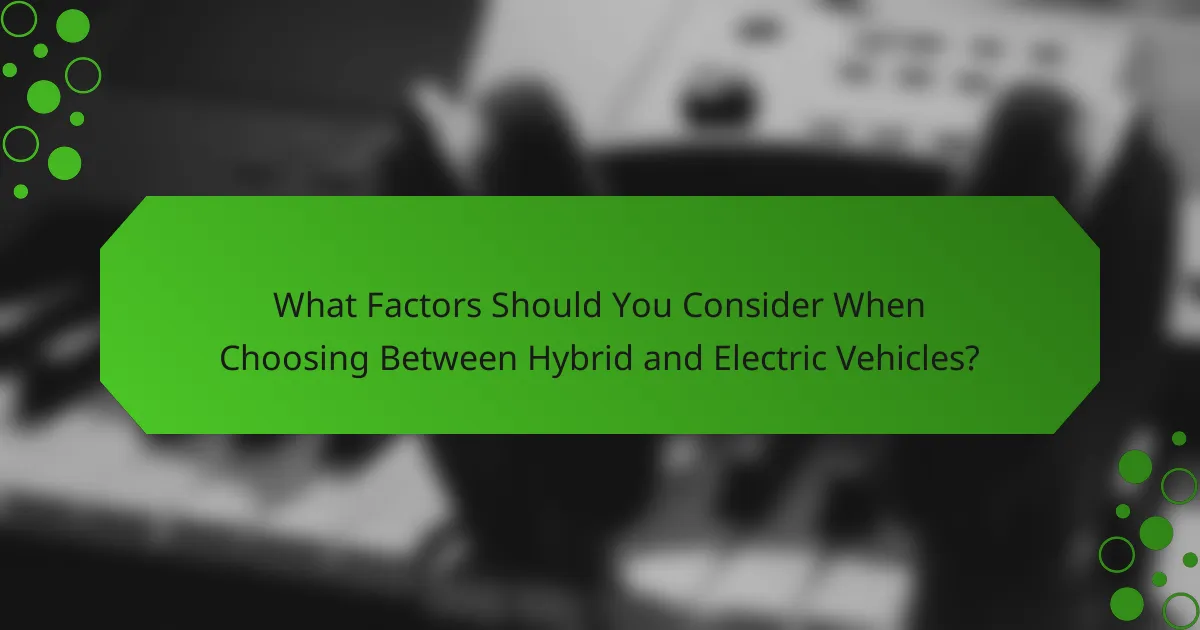
What Factors Should You Consider When Choosing Between Hybrid and Electric Vehicles?
When deciding between hybrid and electric vehicles (EVs), consider factors such as your driving habits, budget, and access to charging infrastructure. Each type has unique advantages and limitations that can significantly impact your overall ownership experience.
Cost Considerations
The initial purchase price of hybrid vehicles is generally lower than that of electric vehicles, though this can vary based on model and features. Additionally, electric vehicles may qualify for government incentives, which can offset their higher upfront costs. It’s essential to evaluate long-term savings on fuel and maintenance, as EVs typically have lower operating costs.
Consider the total cost of ownership, which includes insurance, taxes, and potential charging costs. While hybrids may offer better fuel efficiency than traditional gas vehicles, EVs can provide substantial savings over time, especially with rising fuel prices.
Efficiency and Performance
Electric vehicles are known for their superior efficiency, often achieving higher miles per gallon equivalent (MPGe) than hybrids. They convert energy from the grid directly into motion, resulting in less energy loss compared to hybrids that rely on both gasoline and electric power. This efficiency translates into lower energy costs for EV owners.
Hybrids, on the other hand, combine a gasoline engine with an electric motor, allowing for greater flexibility in various driving conditions. They can be a better choice for those who frequently drive long distances without access to charging stations, as they can seamlessly switch between power sources.
Maintenance and Longevity
Electric vehicles generally require less maintenance than hybrids due to fewer moving parts and no oil changes. The absence of a traditional engine means fewer components that can wear out, which can lead to lower repair costs over time. However, battery replacement for EVs can be a significant expense, typically needed after several years of use.
Hybrids may require more regular maintenance due to their dual powertrains, including both electric and gasoline components. It’s crucial to factor in the potential for higher maintenance costs when considering a hybrid, especially if you drive extensively. Regular servicing is essential to keep both systems functioning optimally.
